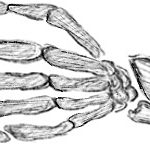December 22, 2008
Mélanie Beauchamp was star gazing.
During the Christmas period of 2008, Vancouver had enjoyed unusual amounts of snow with lower than normal temperatures. Mélanie thought she’d dodged the weather in Montreal by coming to Vancouver to visit friends. Montrealers, at least, knew how to use shovels. Vancouverites, when they try to clear snow, seem to make the attempt with garden spades and flimsy plastic shovels.
Mélanie did not have astronomy on her agenda; she was, in fact, taking a break from teaching the subject. However, when the heavens had parted on December 22nd, she was thrilled to see Orion huge and clear above. She scrambled to find her friends’ aging Celestron telescope after which she put it together on their top floor deck and began to look outward and upward.
Her friends had just left the rooftop deck – complaining of cold – Les Vancouvérois sont tellement poules mouillées, she thought, meaning Vancouverites were wimps. As she took what she thought was her last glance through the telescope, she observed a smudge – an unfamiliar celestial object – on Orion’s belt. (Orion is a large constellation; in the middle there is a band of stars that comprise Orion’s belt.)
Mélanie focused in on the smudge as best as her telescope would let her; she was totally unfamiliar with the object she was observing. It reminded her of the way satellites and other artificial orbital artifacts reflect light, but the object did not move like something in orbit and it certainly did not look like any deep space celestial object. Furthermore, she’d never seen anything like it in that part of the sky – and she’d observed Orion on far clearer (and colder) nights than this.
The Celestron had a camera mount meant for old single lens reflex cameras, which thankfully was compatible with her digital SLR. Fortunately, she had set up the motor drive, which synchronized the telescope’s movements with the earth’s rotation. This allowed her to take some high quality long exposures.
She packed up the telescope, and returned to her friends’ living room where they had a hot cup of tea waiting for her. Mélanie uploaded a couple of the images from her camera to her friends’ computer and posted the images to a network of astronomers. She provided her GPS coordinates along with the images and simply said, “Anyone have any idea what the hell this is?”
December 24, 2008
Mélanie’s email account was full.
She’d not been thinking about her discovery much; she was certain some reasonable explanation would present itself after the holidays. But, when she checked email at the time she planned to send out some Merry Christmas emails, she found that many of her astronomy associates were freaking out and sending her better resolution images of what she had observed.
The other astronomers confirmed that the object she had observed was indeed artificial and it was not produced by humans.
Mélanie wasn’t sure what to think. As she sat in the living room, surrounded by Christmas decorations, near a tree with blinking lights, she felt limp. A piece of alien space junk. This phrase repeated itself over and over in her mind. She’d always believed that the universe was certainly big enough to have self aware, space-travelling life forms other than humans. But it seemed very unlikely that humans would ever encounter them because of the vast distances between solar systems and the incredible age of the universe. She imagined that this piece of space junk could be a million years old from a solar system hundreds of light years away. Or not.
December 27, 2008
Mélanie’s voice mail box was full.
The message from her boss at McGill started with the phrase: “Mélanie, what have you done?”
There was a message from Bob McDonald, from CBC’s Quirks and Quarks, requesting a call back.
An intern from the Discovery Channel was requesting a call back.
Mélanie dutifully recorded the names and numbers in her book, but the only person she called back was Pierre Gautier, the Chair of the Experimental and Observational Astrophysics division of McGill’s Department of Physics. She told him what had happened – hadn’t he checked his email on the 23rd of December? No, he was in the Eastern Townships with his mother who was still annoyed that she lost her rotary phone a few years back – and it wasn’t until he got back to Montreal that he also was blitzed with calls and email.
Mélanie and Pierre agreed that the reason there was not more press coverage was that the discovery occurred over the holidays and that Barak Obama’s impending inauguration was preoccupying much of the US government.
“How do you want me to handle the press that has already called me?”
“Well,” Pierre replied, “I think that you should call them back and limit your answers to the knowledge you have and avoid speculation. Prior to that, study all the data that your colleagues have been sending you. You’ll probably be a bit famous in our circles, but honestly I can’t think of anyone better to handle the media. It would be disrespectful to you were anyone else at the university to speak on the subject. It’s not like you’re a 10-year-old backyard astronomer.”
“Pierre,” Mélanie replied, “I know some 10-year-olds who have better telescopes than what I used to observe this thing.”
“That may be,” he replied, “but according to the worldwide astronomy community, you spotted it first. They are starting to call it the Beauchamp Object.”
“Vraiment!”
January 5, 2009
Mélanie was back in Montreal and preparing for her first class of 2009. On her non-academic to-do list was:
– Buy new phone with unlisted number
– Set up new email to give only to trusted family and friends
– Run through the trajectory calculations sent from Paul in South Africa
– Get to the gym
– Call Mom about Dad’s doctor’s appointment
Pierre walked into her office and put a shiny new Blackberry on her desk.
“What’s this?” she asked.
“I never can get you on the phone, so I made the University buy this one and it’s listed as a computer tech support phone. No one knows it’s going to you. I set you up with a new McGill email account with no ties to you. The Philosophy department was glad to help; and they can’t track their computers or phones worth a damn.”
Mélanie crossed the two items off her list. “You must be psychic.”
“I am merely well-informed,” said Pierre. “You think you are busy doing press work now, wait until Paul’s trajectory numbers make the main stream media.”
“You analyzed them?”
“No, no. A friend at NASA analyzed them. But just you wait, I don’t want to spoil the surprise.”
Later that night, Mélanie finished her own review of Paul’s trajectory numbers. The Object was indeed heading in Earth’s general direction. She’d been telling the press, over and over, that The Object was an ellipsoid 350 km long, 140 km at its widest and 70 km at the highest. It was moving slowly and tipping end over end at a frequency of one revolution every hour. When asked “what’s it made of?” the answer was “no idea”; when asked “where’s it from?” the answer was “no idea;” when asked: “where’s it going?” well … now it was time to revise her answer.
This “Beauchamp Object” or, to use NASA’s preferred nomenclature, an ESADO (Extra Solar Artificial Debris Object), was going to pass very close to Earth. This “ESADO” was 35 times the estimated size of the meteor that is attributed to the extinction of the dinosaurs.
“ESADO” made Mélanie think of cheap Spanish wine. She left her apartment and headed to the nearest Dépanneur to buy a bottle.
January 20, 2009
Mélanie was watching Barak Obama’s inauguration on TV. “Does he know? Does he believe it?”
February 24, 2009
Mélanie was back in front of her TV, watching Barak Obama give his State of the Nation speech. In the past month, the media had been running with the story of the Beauchamp Object (the term still made her blush) reporting that it was heading toward Earth, and that NASA and all official agencies were being very tight lipped.
Mélanie hoped that President Obama would tackle it in his speech tonight.
Madam Speaker, Mr. Vice President, members of Congress, and the first lady of the United States, who’s around here somewhere.
I have come here tonight not only to address the distinguished men and women in this great chamber, but to speak frankly and directly to the men and women who sent us here.
I know that for many Americans watching right now, the state of our economy is a concern that rises above all others, and rightly so. If you haven’t been personally affected by this recession, you probably know someone who has: a friend, a neighbor, a member of your family.
As the speech went on, focused almost exclusively on the economy, Mélanie fretted. The recession wasn’t going to matter a damn if the planet was struck by 2.7 million cubic kilometres of unknown metal. As she listened to the speech, she could feel that it was winding down. But Obama surprised her.
There are surely times in the future where we will part ways. But I also know that every American who is sitting here tonight loves this country and wants it to succeed.
I know that.
That must be the starting point for every debate we have in the coming months and where we return after those debates are done. That is the foundation on which the American people expect us to build common ground.
And it’s with the idea of common ground that I must confirm some information you may already know. Major media outlets have been reporting a large artificial object, known as the Beauchamp Object or an ESADO – NASA can explain that acronym for you – is heading to Earth within this calendar year.
I’ve met with leading scientists and they tell me that The Object is most likely to pass us by, but there’s a chance it might not. If it hits us, it would cause incalculable damage.
I have therefore ordered NASA and related agencies to suspend all other work until we’ve assessed the Beauchamp Object and dealt with the risk.
Because someone made this object, someone not of our Earth, we face technical and spiritual questions in addition to our immediate fiscal crisis. We live in truly incredible times.
But I am certain that America and the world will come together and lift this nation from the depths of challenges, particularly if we put our people back to work and restart the engine of our prosperity, if we confront without fear the challenges of our time and summon that enduring spirit of an America that does not quit, then some day, years from now, our children can tell their children that this was the time when we performed, in the words that are carved into this very chamber, “something worthy to be remembered.”
Thank you. God bless you. And may God bless the United States of America. Thank you.
Mélanie got a text message from Pierre: “You are going to be very, very busy.”
March 16, 2009
David Letterman was winding up his monologue.
We have a good show for you tonight, folks … Julia Roberts is here. <<huge applause>> Our musical guest is Bell X1 and, to lighten the tone a little, we have Melanie Beauchamp, the lady who discovered the huge piece of space junk that threatens to kill us all. <<pause>> And I was worried about Leno’s new show … <<cut to commercial>>
Mélanie was pacing the Green Room in an elegantly sexy, but not actually comfortable, Dior suit that her mother insisted she wear. “How the hell did I end up here?” she thought. A fight-flight response did not begin to describe her nerves. Julia Roberts, her security guard and press agent passed Mélanie. To the entourage’s annoyance, Julia Roberts stopped and said to Mélanie, “Are you nervous?”
“Absolument, uh, yes, of course!”
“Good,” Julia said, “you’ll do great.”
This left Mélanie and the two Julia handlers to watch the show on the Green Room monitor. As Letterman greeted Julia, she whispered to him, “Is it OK if I stay for your interview with Melanie Beauchamp?”
“You can stay on my couch as long as you like,” said Letterman.
Julia stayed fairly close to the usual topics of family and funny happenings on the set of Duplicity.
And when we get back, Melanie Beauchamp, ladies and gentlemen.
“Julia’s not coming off,” said Handler 1.
“She has to come off; we have an appointment.”
“She’s not coming off,” they said in unison and turned to Mélanie and continued. “Did you know she was staying on?”
“Uh, no,” was Mélanie barely coherent reply.
A Letterman staffer said, “Ms Beauchamp,” we’re ready for you.
Ladies and gentlemen, please give a warm welcome to Melanie Beauchamp, who was the first to observe what NASA’s calling an ESADO. <<pause>> I hope someone got paid a lot for that dumb term.
Mélanie walked on stage to healthy applause and a strangely jazzy rendition of “It’s The End Of The World As We Know It (And I Feel Fine)” by REM. Dave greeted her and gave her a brief hug. Julia Roberts stood and kissed Mélanie on each cheek. Once settled on the couch, Dave motioned Paul, and said, “OK, Paul, that was weird.”
Letterman: I have to tell you Melanie, for a scientist you look great. In some cases better than some A-listers I get on the show. <<Julia makes a face>> Present company excluded.
Beauchamp: Of course!
Letterman: Because Julia’s here, I’ll jump right in and ask, “Who are you wearing?”
Roberts: It’s Dior, Dave.
Beauchamp: It’s my mother’s fault.
Letterman: How’s that?
Beauchamp: She owns a dress shop in Montreal and she said “There’s no way you are going on Mr. Letterman’s show and not wearing something nice!”
Letterman: She called me “Mr. Letterman”?
Beauchamp: “Monsieur Letterman,” to be exact.
Letterman: Wow. I think I could get used to that.
Roberts: Calm yourself Dave.
Letterman: Melanie, there are so many questions in my head about this ESADO thing that I guess I’ll just ask the obvious, “what the heck is it?”
Beauchamp: Well, there’s no consensus right now. We know for sure that it’s not an asteroid or a comet because of its shape, which is kind of a disc, a shape that just does not appear in nature.
Letterman: So, somebody made it?
Beauchamp: Yes.
Letterman: But, it’s huge. 215 miles across?
Beauchamp: Yes, about that.
Roberts: And if it hits us?
Beauchamp: That would be bad.
Letterman: How bad?
Beauchamp: Really bad. The meteor that people say led to the extinction of the dinosaurs was only about 6 miles wide.
Letterman: Ouch. But it’s not likely to hit us, right?
Beauchamp: Again, there’s no real consensus on that either. We will know for sure this December, but what I’m hearing from NASA and the European Space Agency is that they don’t like how close it will come.
Letterman: I hear the bookies in Las Vegas won’t make odds on it because if it hits, they can’t collect. <<laughter>> But the real question is, can we do anything about it from here?
Beauchamp: In my opinion we should use the Space Shuttles to examine it up close because, how cool would that be? And, I’m sure there has to be some way to change its course so it won’t hit us.
Letterman: Would you want to go in the Shuttle?
Beauchamp: Of course! But I am not qualified.
Roberts: I read that you have two degrees and are a tenured professor.
Letterman: I thought I was the one who had research staff.
Beauchamp: Well, if you want someone from Quebec who’s really qualified, you want Julie Payette. She’s already an astronaut, she has a Master of Applied Science in Computer Engineering, is a commercial pilot, speaks five languages, has about 600 hours of space time, is a classically trained musician, and is a mother of two. I’m a big fan of hers but thinking about what she does in a day tires me out.
Roberts: Dave, you should have her on the show too.
Letterman: I will, if we live.
Back at her hotel, Mélanie was too tired to think. She carefully extricated herself from the Dior suit, showered, put on comfortable pajamas and flopped into bed. Although it was dinner time, she did not care. She was asleep.
March 17, 2009
Back in Montreal, Mélanie was at her mother and father’s house trying to fill them in on every detail about the Letterman experience.
“Maman, if you keep asking questions, it won’t be worth watching the show.”
Letterman came on the TV and the three of them watched in silence.
“You were brilliant,” said Mélanie’s father.
“The dress really worked; you looked lovely,” said her mother.
“I’m going to bed,” said Mélanie.
Once comfortable in her bed, her phone rang. Mélanie looked at the display. PAYETTE. “Oh crap,” Mélanie thought. “‘Allo?”
“Mélanie, c’est Julie Payette.“
“Comment va-t-il?“
“NASA m’a appelé dix minutes passé. Merci beaucoup; Je suis assigné à la mission.”
“What mission?” Anything to do with NASA compelled Mélanie to speak in English.
“The Shuttle missions to move The Object. Had I known someone talking about me on Letterman would sway crew assignments, I’d have hired a press agent!”
April 10, 2009
Mélanie walked into Pierre’s office at McGill. She placed a hand-written note in front of him:
Stop the dirty lies you dirty bitch – there’s no such thing as aliens – God created the earth and us in His likeness. You’ll pay for you’re lies bitch.
“Yes, well. He doesn’t spell your correctly, does he?”
“Pierre …”
“Yes I know. It’s getting too much. I have a confession to make: I asked the IT department to filter your email because we were getting worried. People’s vitriol increases as we get closer to contact with The Object. People are focusing on you and that’s not good.”
“But, I don’t want to quit. Or hide.”
Pierre’s desk phone rang. He picked it up. “Yes, yes, send them in; the timing’s perfect.”
Mélanie stared at Pierre.
“I took the liberty,” he continued, “of asking for some security help. Since you are crossing borders all the time, I contacted a friend of mine at the Canadian Border Services. They, in turn, asked sister agencies for resources.”
Three large men entered Pierre’s office.
“Mélanie, please meet your shadows. James, Luc and Konrad.”
Mélanie looked at the three men. She was five-foot-eight, an OK height, but these guys were at least six-four. And built like brick walls. She shook their hands.
James spoke first; he had the distinct tone of someone who chewed gravel. “Yes, Ma’am we will be taking shifts covering you 24/7. Our respective departments did a risk assessment and at this time we feel that our presence should deter the basic crazies from annoying you.”
“24/7?”
“Yes, Ma’am. Three eight hour shifts.”
“I guess I know where to go for a last minute date, then, eh?”
“If necessary Ma’am. However, I think I can speak for the three of us, when I say we aren’t much fun.”
June 12, 2009
Mélanie was waiting in the Green Room for The View. Her talk show circuit had seen her on the road so much that she was starting to get used to the process. She had the feeling that NASA and the other Space Agencies were using her as a distraction from their planning process. She knew that the CPUs were likely wanting to melt under the demands to simulate the mission to move The Object. Her not-so-inner scientist wanted to know what they were thinking.
One of The View‘s production assistants said, “We’re ready for you Ms Beauchamp.”
Whoopi: We are thrilled to have on the show today Melanie Beauchamp, the McGill Professor of Astronomy who first observed what is now called the Beauchamp Object in the night sky.
Mélanie gave all the ladies a quick hug hello: Joy, Sherri, Elizabeth, Barbara and Whoopi.
Whoopi: So, I understand you’ve been on the road a lot!
Beauchamp: It’s true, but this is an opportunity that you simply cannot turn down.
Joy: What I want to know is … what’s with those guys with you?
Beauchamp: Ah, my “shadows.” A gift from the Canadian government I can’t turn down.
Whoopi: Are you saying that because this Object is alien – I can say stuff like that; I used to be on Star Trek – that people are blaming you?
Beauchamp: Certainly I am a person associated with this situation. The Object has brought up many questions that have seemed to have unhinged people.
Joy: And those big men to keep the nutcases away from you? I kind of like the dark-haired one.
Beauchamp: Luc? Oh, he’s fine. But you don’t want to watch these guys eat. It’s scary. <<laughter>>
Sherri: Now with this being a panel of women interviewing you, is it just luck that they found a scientist who dresses as well as you?
Beauchamp: Oh thank you. When your mother is insistent on haute couture and bonne comportement it doesn’t matter how much of a geek you are under the garments and make-up.
Sherri: You have such a cool accent.
Barbara: Of course what we want to know is what is NASA doing about this piece of space junk? If it hits us, it’s end-of-the-world stuff.
Beauchamp: NASA and other agencies are keeping the analysis secret because they are likely in a brain-storming phase. If you get distracted by reactions to ideas that you may throw out anyway, it tends to waste time.
Barbara: Do you get any advance warning of decisions or plans they make?
Beauchamp: Maybe a little. But by the time I do my own analysis, the information is out there. I don’t like talking about stuff until I figure it out. I think people expect me to make it simple.
Elizabeth: What’s your favourite theory about where this Object is from? I’ve seen a number of your interviews and you never really answer this question, but I’m dying to know what makes sense to you.
Beauchamp: You’re not going to let me dodge that question, are you?
Elizabeth: No way!
Beauchamp: OK, this Object is not moving very fast. Assuming it was made in another solar system, it’s been on the move for literally thousands, maybe millions of years. I think it’s an artifact (maybe part of a space station or space ship) of another civilization – one that has long since vanished.
Barbara: You don’t think anyone’s on The Object now, do you?
Beauchamp: No, The Object is not under power and there’s no variation in its temperature. If there was activity on or in it, something would show up. A lot of telescopes have looked at this thing now.
Whoopi: Wow, I just never thought I’d be in a real life Star Trek episode. We’ll be right back with Melanie after we get some bidniss done. <<cut to commercial>>
July 4, 2009
Two days earlier, Mélanie had received a preview to the plan for the Shuttle mission to move The Object. It was ambitious. At first glance, almost insane.
Mélanie’s popularity required her to rent a different apartment in Montreal. It was a tiny flat – she didn’t need much as she was on the road so much – but it allowed her to escape for small periods of time.
Barack Obama was on TV, giving a July 4 speech.
As we celebrate our amazing country as it faces an historic economic challenge, I have the privilege today of giving you an update on our “Outer Space” problem.
The Beauchamp Object is still coming toward Earth and our best scientists do not feel it’s good enough to sit on our hands and hope for a miss. We need to make sure this Object is out of our way.
These same scientists also don’t hide their curiosity about The Object – we all share it – and I agree that we can’t miss an opportunity for study. But, I said to them: “safety first; curiosity second.”
In concert with all world space agencies, with a command centre on the International Space Station, we will launch in December all three Shuttles in our fleet to meet this threat. Discovery, Atlantis and Endeavour will be loaded up with portable thrusters that will be attached to The Object. Then the thrusters will be fired up in a controlled manner and will change the movement of The Object and take it out of our way.
This plan to me embodies both American spirit, ingenuity and a new found ability to co-operate with other nations. What I have seen in the world in our ability to rise to challenges has made me more proud than I thought possible to be an American and citizen of the world.
Mélanie fretted. What she read and was hearing from people willing to talk to her off the record was that everything about this mission was at maximum. There were going to be an unprecedented number of shuttle launches to put equipment on the International Space Station. The distance that The Object was going to be engaged was at maximum distance for the Shuttles. The strain on the astronauts was going to be huge.
But what was simple was the idea for moving it. The thrusters they had in mind were cheap to make, relatively light, and could be networked by computers to manipulate the thrust. A large number of thrusters would be needed but the level of control would be significant. Overall, it was a much less dramatic solution than trying to blow up The Object or something equally Hollywood.
Her phone rang. It was Pierre.
“Hello?”
“Mélanie, can you come to Ottawa with me tomorrow?”
“Why?”
“The Prime Minister wants to see us on Monday.”
July 6, 2009
The cab from the hotel dropped Mélanie, Pierre and Konrad – the security agent on duty at the time – in front of Parliament Hill.
Hill Security escorted the three to the Prime Minister’s Office where they waited. Eventually an Aide to the Prime Minister ushered all but Konrad in to meet Stephen Harper.
The Prime Minister shook their hands and asked them to sit.
“I have to say that you two have done an excellent job representing Canada during this situation with The Object. I’ll be frank in saying that I’ve taken a fair bit of flak for not meeting with you sooner.”
“What can you do about the press, hein?” said Pierre.
Mélanie was shocked by Pierre’s glibness, but kept silent.
“I’ll get right to the point here. First, I want you two to know that I want you to keep the good work you are doing going. There’s a lot of speculation and fear-mongering going around and I appreciate you sticking to the facts. Second, I know that you have security. Has it been adequate?”
Harper looked directly at Mélanie at this point.
“Ah, yes. The three principal agents have been totally professional and I feel safe,” said Mélanie.
“I’m glad to hear it. I want you to know that if you need any further protection, we will arrange it.”
“OK,” said Mélanie.
“Third,” continued Harper, “President Obama has arm-twisted the world governments into funding this mission, the cost of which is massive. He’s using a formula of percentage of GDP. What I really want to hear is that this Beauchamp Object – I’m sure you are thrilled that name took and not that ESADO name that NASA’s trying to use – is for real. That the threat is real and that we have no other choice but to commit to the mission.”
Mélanie was shocked that someone at this level of government could harbour any doubts given the readily available data on The Object.
Pierre was a faster talker. “Prime Minister, I assure you that this is for real. The closer The Object gets to Earth, the more the odds improve in favour of it hitting us.”
Harper turned to Mélanie.
“Yes, sir,” said Mélanie. “I crunch the numbers as I get them from our sources and there does not seem to be any doubt.”
“OK,” said Harper, “What about the plan that NASA’s come up with? It sounds complicated.”
“It’s only half complicated,” said Mélanie. “The brilliant part is to employ the many thrusters instead of trying to find a single source of movement. This gives much more room for the unexpected and in the end delivers more control over the moment. Our own technical limitations are what make things complicated. We would rather meet The Object deeper in space. But, the Shuttles have limits. Other limits include payload per Shuttle, which is why so much gear has to be taken up to the Space Station ahead of time. Since we don’t have a clue what The Object is made of, they have to plan for different scenarios when they try to move it.”
Pierre cut her off. “Prime Minister, she could go on for days. The point is that in our opinion – and we’ve literally been at the problem longer than anyone – NASA and the other Space Agencies have come up with a risky but do-able plan.”
Harper looked at them both. “Well, I guess we’re in with both feet.”
August 31, 2009
Mélanie was dipping her feet in Lake Massawippi. She was hiding at Pierre’s mother’s cabin in Quebec’s Eastern Townships where it was stinking hot (32 Celsius) therefore she was outside in a bathing suit, sitting on the dock. She was away from the media and the science of her life, but the presence of Luc reminded her that she was not back to normal. He looked ludicrous in regular undercover cop clothes.
“Luc, get a bathing suit and come in.”
“Sorry Ms Beauchamp. I’d love to, but one photo of me in the water with you would ruin us both. How about next summer?”
“You think there’s going to be a summer for anyone next summer?”
“A man can hope.”
November 27, 2009
A strange hush was coming over the world. With the exception of people for whom the stress of possible global disaster had unhinged, crime was down, the markets were flat. All commodities were static with the exception of wine and spirits; it seemed many people were self-medicating. Everyone waited, even though contact with The Object was not due until December 23.
Meanwhile, Mélanie was on CBC’s The National.
Mansbridge: Mélanie, it’s good to have you on the show again.
Beauchamp: It’s good to be back, Peter.
Mansbridge: We are less than a month away from the final stage of the mission and you are the envy of every journalist in the world because you have been involved since the beginning. What do you think of the chances of success?
Beauchamp: Chances are hard to calculate when there are unknown variables. But, I know from talking to so many people that the best people in the world are doing the work. The Object has given the whole world a common focus never seen before. There’s no reason the mission won’t succeed.
Mansbridge: It’s difficult to avoid pointless speculation, but I am really curious about your views on one concept. The Object seems unerringly aimed at Earth. With Space being so huge, isn’t that unlikely? Which makes me wonder, was it intended for us all the time?
Beauchamp: I think The Object being observable by us at all is unlikely. The fact it’s drawn to Earth is, in my view, the result of the angle at which The Object entered the solar system and Earth’s gravitational pull. The Object has taken years and years to get here. If this were deliberate, it would be like throwing a baseball at someone, but instead of throwing it with speed, you’d get on your hands and knees and roll it along the ground to your intended target.
Mansbridge: <<laughing>> This is why the media likes you. One last question: once the Shuttle crews get their eyes on The Object, do you think there will be clues as to its origins?
Beauchamp: Oh do I ever hope so.
As Mélanie was leaving the CBC studios in Toronto, her phone rang. It was Pierre. “They want you at Cape Canaveral as soon as possible.”
“Why?”
“They figure they owe you as much and, it seems, they consider you their lucky charm.”
December 23, 2009
Discovery, Atlantis and Endeavour were all in orbit. Mélanie had the pleasure of meeting all the crews as they boarded the orbiters. She had wished Julie Payette special luck as she boarded Endeavour.
She could not imagine how brave these people were to be undertaking such a mission. She felt that she was just the mouthpiece – she had not done anything but review their plans, and talk about them in plain language with the public. Now these men and women were going to execute the most dangerous space operation ever conceived. The price of failure was unimaginable.
Konrad was shadowing Mélanie that day. They walked down a corridor toward an office they’d set up for her, but she was interrupted by a Mission Control Specialist. “Ms Beauchamp, they’re ready for you in the VIP mission observatory.”
She and Konrad were ushered to an unmarked door and led in.
Inside were some of the more famous faces in the world. They all had comfortable chairs that watched the status screens and live feeds of the mission. President Obama interrupted a conversation with some aides and approached her. “Ms Beauchamp, a pleasure to finally meet you.” And they shook hands.
“The honour is mine, Mr. President. You can call me Mélanie if you wish.”
“Well, Mélanie that’s great. I hope to be able to introduce you to Michelle, Malia and Sasha later. They find all this technical stuff pretty dry so they’re taking a break. The girls think you are pretty cool.”
“That’s terrific; thank you for inviting me.”
“It seems fitting. You better take a seat, if I’m right the Shuttles are about to make first visual contact.”
Mélanie was seated and watched the big screen resolve. The radio chatter from the Shuttles and Space Station were piped into the room. The Object looked like a dull grey disc. As the Shuttles moved into position, the perspective was lost and the whole screen looked grey.
Endeavour was in charge of the scientific research. The mission had been allowed a very narrow window of time where it would take samples and do visual recording of the surface. Endeavour lit up the surface of The Object and everyone in the VIP observatory gasped. Once the light hit the surface, a variety of markings, which seemed impossible to be anything else but language, appeared. “Are you all seeing this?!” said Endeavour.
“Yes,” replied Mission Control. “Stay focused. We’re on a tight time line.”
Mélanie thought that – assuming the plan worked – a whole new discipline of xeno-linguistics had just been born.
Each Shuttle had special equipment to deploy the small thrusters. The trick was to make sure they all attached in the pre-planned location. Each thruster would have just the right momentum to reach The Object and would issue a tiny bit of thrust to keep it stuck on the surface.
It was going to be well into the next day before the job was complete and the thrusters could be fired. No one on the planet missed the point that due to the limitations of how far the Shuttles could travel from Earth, The Object had to come dangerously close to Earth before the plan could be executed.
December 24, 2009
Mélanie did not sleep and did not stop blogging on her computer. She took bio-breaks only as needed, kept a video line open to her parents, and really did enjoy meeting the Obama girls.
So far the mission had gone according to plan. They were 90 percent finished with the deployment of the thrusters. Then the worst sound you could hear on the radio came through. “We have a problem,” reported Atlantis. “A thruster has got away from us – looks like its gas tank burst.”
“We’re hit,” reported Endeavour.
“What’s going on?” asked Obama.
“Get me a camera on this!” ordered Mission Control.
The VIP observatory screens showed a scratchy image of Endeavour‘s tailfin. A large portion of it had been broken off. Endeavour was listing oddly.
“Endeavour, do you have attitude control?”
“Yes,” reported Endeavour. “We are in the process of getting ourselves back into position.”
“Any other damage?”
“All systems normal; it looks like our damage is strictly external.”
“Stand by.”
Mélanie was feeling light-headed. Endeavour was not coing home. She figured Mission Control was wondering what to do.
“Endeavour,” called Mission Control. “Deploy the rest of your thrusters asap. Once you are done, get yourselves to the Space Station. We stick to the plan.”
“Acknowledged.”
It was 10:43 PM eastern time. The Shuttles had moved off and the thrusters on The Object fired up. The calculations for how much thrust had been repeated, simulated and repeated endlessly. Now it was time to see if the math worked.
It was going to take more hours of watching monitors to see if it worked. Mélanie thought the waiting would drive her crazy. It occurred to her that if it did not work, the only humans left would be those on the Space Station. They would be short lived witnesses to the end of humanity.
December 25, 2009
By 2 AM, Mélanie was personally sure that the crisis had passed. But it was up to Mission Control to call it. They were confirming with the International Space Station that their ground-based readings were correct.
At 2:12 AM eastern time, Mission Control announced: “We are relieved to report ‘mission accomplished’.”
“Not a bad Christmas present,” said President Obama as he worked the room shaking hands and hugging everyone he could find.
Mélanie’s three shadows stood nearby. She threw herself at each one in turn and kissed them hard.
A text message came in from Pierre. “I guess you can take the day off.”









